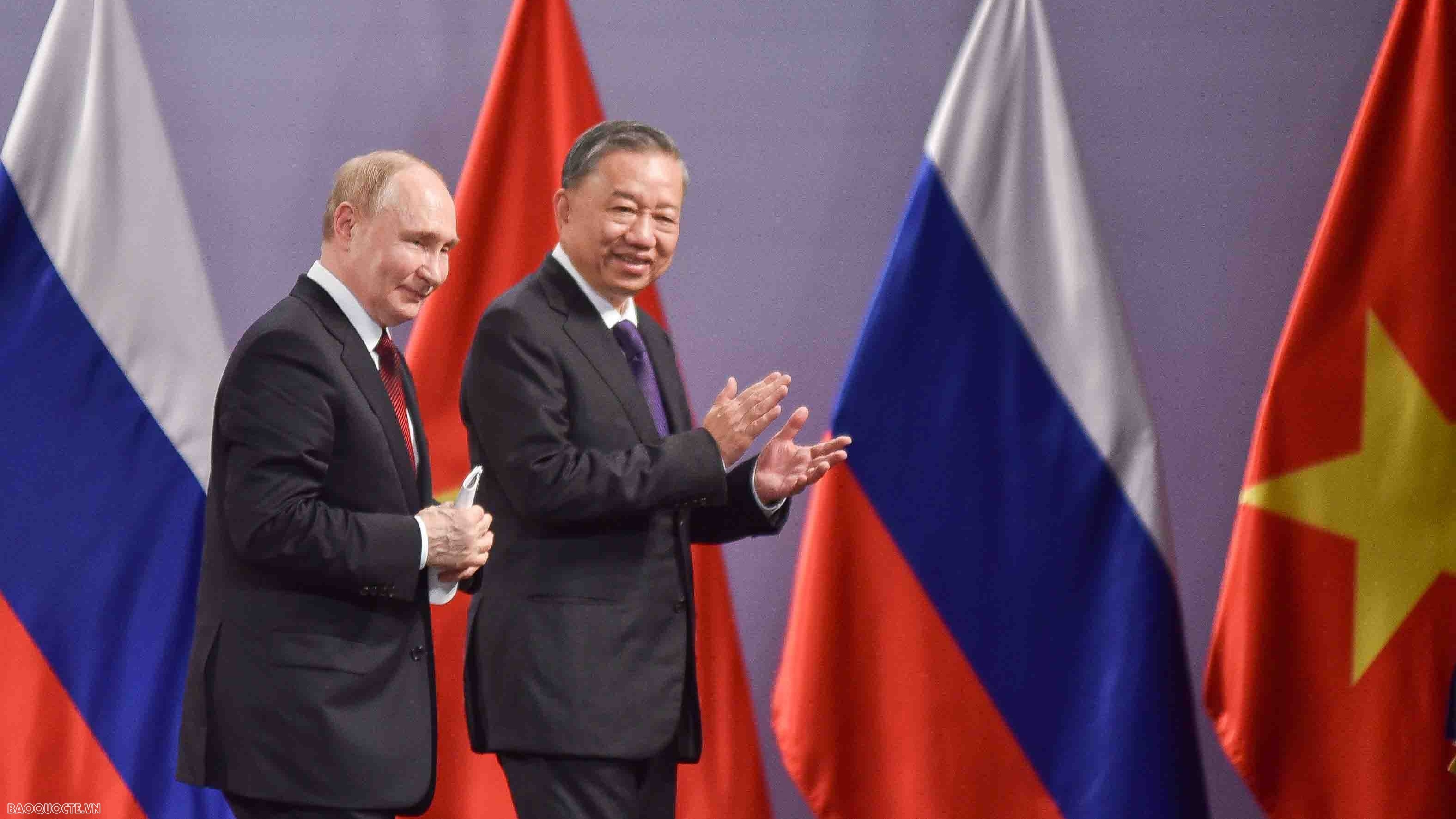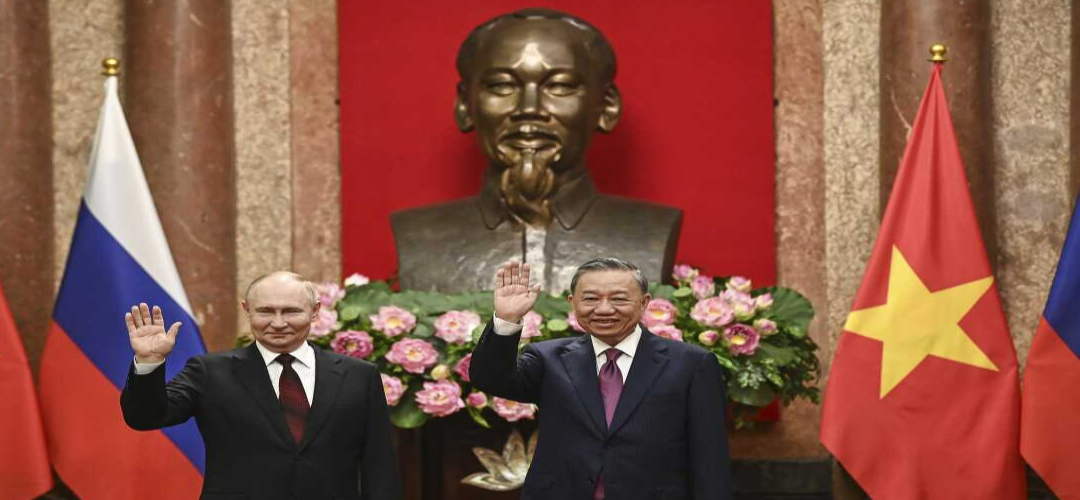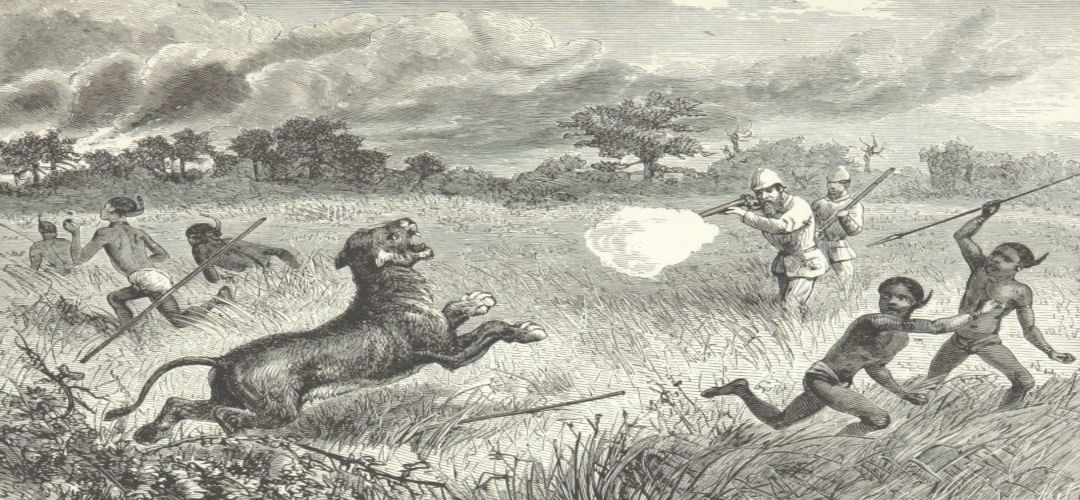Why has this stoic nation become so relevant?
In recent years, Vietnam has emerged as a significant player on the global stage, finding itself at the heart of a great power rivalry. Despite being a communist nation with a tumultuous history, Vietnam’s strategic diplomacy and economic growth have made it a coveted partner for major powers, including the United States, China, India, and Russia.
The recent visit of Russian President Vladimir Putin to Vietnam was yet another dignitary in the growing list of powerful heads of government headed towards Hanoi. It underscores the country’s growing importance in international politics.
Background
Vietnam’s geopolitical importance is deeply rooted in its history and strategic location in Southeast Asia. Vietnam’s diplomatic strategy, often called “bamboo diplomacy,” emphasises flexibility and resilience. This approach allows Vietnam to balance its relationships with multiple global powers without aligning too closely with any one nation.
The country’s relationship with China has been long and complex, marked by both cooperation and conflict. While the two nations share a communist ideology and have strong economic ties, their relationship has been marred by territorial disputes, most notably in the South China Sea, which Vietnam refers to as the East Sea. The 1979 Chinese invasion and the ongoing maritime disputes in the South China Seas leave chronic wounds that are hard to heal and forget.
The balancing strategy was evident during President Biden’s visit in September 2023, when the U.S. upgraded its relationship with Vietnam to the highest level in its diplomatic hierarchy. This was followed by Chinese President Xi Jinping’s visit, where both nations agreed to build a “Vietnam-China community with a shared future,” signalling Vietnam’s intent to maintain strong ties with its northern neighbour. The two sides also agreed to cooperate in green energy and critical minerals, further strengthening their economic relationship.
Vietnam has maintained a close relationship with Russia, dating back to the Soviet era. The Soviet Union was a crucial ally, providing military and economic support during the Vietnam War. This legacy continues, as Russia remains Vietnam’s primary arms supplier. However, in recent years, Vietnam has sought to diversify its defence procurement, sourcing weapons from Israel, South Korea, and other nations. India, too, has been trying hard to become a seller.

Analysis
Vietnam’s balancing act between China and the U.S. is a testament to its adept diplomacy. While it seeks to deepen economic and security ties with the U.S., it cannot afford to alienate China, its largest trading partner. Trade between Vietnam and China was approximately $235 billion in 2022, with many Vietnamese exports to the U.S. relying on raw materials from China. This interdependence necessitates a careful diplomatic balance.
Vietnam’s strategic importance is also reflected in its response to global conflicts, such as the Ukraine war. Despite its historical ties with Russia, Vietnam has maintained a neutral stance, abstaining from UN resolutions condemning Russia’s invasion while also underscoring the principles of sovereignty and territorial integrity. This nuanced position allows Vietnam to navigate complex international dynamics without alienating key partners. Yet, Russia continues to see Vietnam as an enduring partner, as demonstrated by Mr Putin’s recent visit to Hanoi. Twelve MoUs were signed during the visit, covering civil nuclear projects, energy cooperation, and defence.
This renewed partnership is strategic for both nations. For Russia, it signals that despite Western isolation, it retains significant allies in Asia. It ensures continued access to Russian military hardware and energy resources for Vietnam, which is vital for its economic and security needs. The two countries have collaborated on energy projects, particularly in oil and gas exploration in contested areas of the South China Sea.
Vietnam’s foreign policy is characterised by diversification and multilateralism. By engaging with multiple partners, Vietnam reduces dependence on any single country, enhancing its strategic autonomy. This approach is evident in its relationships with South Korea, Japan, and India, all of which have become comprehensive strategic partners in recent years.
South Korea, for instance, has emerged as a key economic partner. In December 2022, Vietnam elevated its relationship with South Korea to a comprehensive strategic partnership, highlighting the importance of bilateral trade and investment. South Korean companies, such as Samsung, have substantial manufacturing operations in Vietnam, contributing to its economic growth. It is not uncommon to unbox smartphones and other electronics in India and see the ‘Made in Vietnam’ label proudly displayed.
Similarly, Japan has been a longstanding partner of Vietnam, providing significant development assistance and investment. In November 2023, Japan’s Prime Minister visited Vietnam, further cementing their strategic partnership. Japan’s involvement in infrastructure projects and support for Vietnam’s economic reforms have been crucial for its development.
India, too, has strengthened its ties with Vietnam, particularly in defence and maritime security. As both countries sought to counterbalance China’s influence in the region, their cooperation deepened. India’s “Act East” policy aligns well with Vietnam’s foreign policy objectives, creating a strong foundation for collaboration. According to the Economic Times (22 April 24), India has offered Hanoi BrahMos missiles and the Akash air defence system. In 2022, India supplied 12 high-speed patrol boats under a $ 100 million line of credit.
Vietnam’s ability to maintain an independent foreign policy is a testament to its strategic foresight and diplomatic skill. The country has managed to navigate the complexities of great power politics while safeguarding its national interests. Vietnam’s neutrality in the Ukraine conflict underscores its commitment to sovereignty and territorial integrity principles.
Vietnam’s economic aspirations are a driving force behind its proactive foreign policy. The country aims to become a high-income nation by 2045, a challenging goal given its current GDP per capita of around $4,000. To achieve this, Vietnam needs to attract foreign investment, boost industrial production, and expand its export markets. The U.S. has been a significant partner in this regard. During President Biden’s visit, the two countries agreed to boost Vietnam’s semiconductor industry by developing teaching labs and training courses to enhance the country’s industrial workforce. This cooperation is crucial for Vietnam as it seeks to become a key player in the global high-tech supply chain.
Vietnam’s ability to attract attention from major powers is also due to its economic potential. The country is one of the fastest-growing economies in Southeast Asia, with significant exports in electronics, garments, and shoes. Trade between the U.S. and Vietnam reached $140 billion in 2022, a sevenfold increase since 2010. Economic dynamism makes Vietnam an attractive destination for foreign investment, particularly from high-tech companies looking to diversify their supply chains away from China.
Vietnam’s reserves of rare-earth minerals, essential for manufacturing high-tech products from smartphones to jet fighters, further enhance its strategic value. With China currently dominates the rare-earth market, Western nations are keen to develop alternative supply chains. Vietnam’s mineral wealth positions it as a critical player in this sector, attracting interest from both the U.S. and China.
Assessment
- Vietnam’s growing relevance in global politics results from its strategic location, economic dynamism, and adept diplomacy. Its ability to balance relations with major powers like the U.S., China, and Russia while pursuing national interests underscores its sophisticated foreign policy.
- The recent high-level visits from leaders of the U.S., China, and Russia are a testament to Vietnam’s rising importance on the world stage and its role as an independent actor capable of leveraging its position for maximum strategic advantage.
- The country’s ability to maintain a balanced and independent foreign policy while fostering economic growth and diversification makes it an indispensable partner for major powers. As Vietnam continues to navigate the complexities of international relations, its influence and importance are set to grow, solidifying its status as a key player in the global arena.




